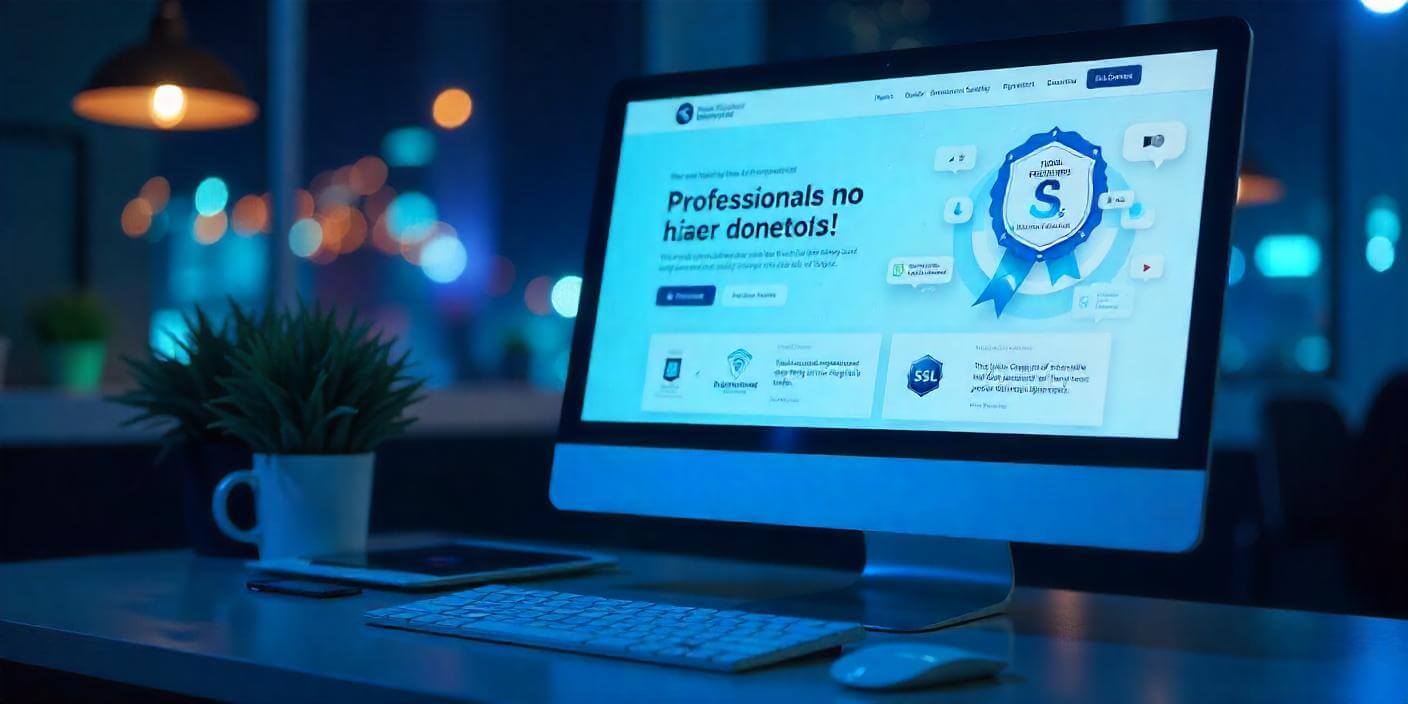Why do you need a Website to run your Company

In today's digital age, having a website is no longer optional for businesses. It has become an essential tool for companies of all sizes, regardless of their industry. Whether you're a small local business or a large multinational corporation, your online presence is critical to your success. But why is a website so vital for your business? How does it impact your growth, customer engagement, and marketing strategies? Let's dive deep into these questions and understand why a website is more than just an online brochure; it’s your gateway to a world of opportunities.
Table of Contents
- The Digital Shift: Why Every Business Needs an Online Presence
- Building Trust and Credibility
- Boosting Brand Awareness
- Expanding Your Customer Reach
- Round-the-Clock Accessibility
- Cost-Effective Marketing and Advertising
- Customer Engagement and Retention
- Harnessing the Power of WordPress for Your Business
- SEO and the Role of a Website in Ranking Higher
- Conclusion

2. The Digital Shift: Why Every Business Needs an Online Presence
The shift towards the digital world has accelerated over the last decade, especially with the rise of e-commerce, social media, and mobile technologies. More people are using the internet to find products, services, and solutions to their needs. Without a website, you're essentially invisible to this vast audience.
A website acts as your virtual storefront. Just like you wouldn’t operate a physical store without a sign, running a business without a website means you're missing out on a massive pool of potential customers. But it's more than just being seen—it’s about staying relevant in a market that is continuously evolving.
Recent advancements in web technology, like AI-driven personalization, chatbots, and mobile responsiveness, allow businesses to offer seamless and highly customized user experiences. These advancements make your website a dynamic, evolving platform that can cater to your customers' needs more efficiently than ever before.
In this section, we’ll explore why embracing this digital shift is crucial for any business, including how the latest web technologies can help enhance customer experience, streamline operations, and improve your bottom line.
3. Building Trust and Credibility

One of the most significant reasons you need a website is to build trust and credibility with your audience. In the modern marketplace, consumers expect businesses to have an online presence. If your business doesn't have a website, potential customers may view you as less trustworthy or less professional than competitors who do.
A professionally designed website can showcase your expertise, experience, and products or services in a way that resonates with your audience. Adding testimonials, reviews, and case studies builds confidence in your offerings. A well-maintained website shows that you are committed to your customers and dedicated to delivering value.
Furthermore, a website gives you control over your brand’s narrative. Unlike social media platforms, where content and layout are limited by platform constraints, your website allows you to customize the look, feel, and messaging to match your business’s tone and mission. This customization can significantly improve how potential customers perceive you and whether they choose to do business with you.
4. Boosting Brand Awareness
A website serves as the hub of your business’s online identity. It’s where potential customers go to learn more about what you do, how you do it, and why they should choose you over your competitors. Through the use of SEO-friendly content, consistent branding, and engaging visuals, your website becomes a powerful tool for increasing brand awareness.
In this era of constant connectivity, most consumers will research a brand before making a purchase decision. Your website gives you a platform to tell your story, highlight your values, and communicate your unique selling points. This builds a connection with your target audience, encouraging loyalty and brand recall.
Additionally, blogs, videos, and social proof embedded on your website not only enhance your brand’s credibility but also provide a deeper engagement channel for your audience. For example, writing insightful articles related to your industry can position you as a thought leader, making it more likely for potential customers to turn to you when they need products or services in your niche.
5. Expanding Your Customer Reach
Without a website, your customer base is limited to those who can physically find or contact you. However, with a website, you can expand your reach beyond geographical boundaries, tapping into new markets, both locally and globally.
A website ensures that you’re accessible to anyone with an internet connection. Whether it’s someone in your neighborhood or someone halfway across the world, your website makes it possible for them to discover your business, browse your offerings, and make a purchase or inquiry.
This is especially relevant if you’re running an e-commerce business or offering services that can be provided remotely. Websites that feature multilingual capabilities or currency converters open up even more possibilities for global expansion. As more businesses recognize the need to operate on a global scale, a website becomes a necessary tool to attract diverse audiences.
6. Round-the-Clock Accessibility
One of the key benefits of having a website is that it allows your business to be open 24/7. Unlike a physical store with set hours, your website remains accessible to customers at any time. This means you can generate leads, process sales, or provide information even when you’re not actively working.
For customers who prefer shopping or researching outside regular business hours, your website offers the convenience they need. Moreover, incorporating features like FAQs, live chat, or self-service portals enhances the user experience by providing immediate solutions without waiting for business hours to begin.
The ability to be "always open" not only improves customer satisfaction but also helps increase revenue by capitalizing on after-hours sales or inquiries. With a robust, user-friendly website, your business never has to close its doors.
7. Cost-Effective Marketing and Advertising
Traditional marketing methods like print ads, TV commercials, or direct mail can be expensive and often don't provide the same level of return on investment (ROI) as digital marketing. A website offers a more cost-effective solution for promoting your business. With a well-optimized website, you can reach thousands of potential customers with minimal upfront costs.
Tools like Google Ads, Facebook Ads, and content marketing allow you to target specific demographics, ensuring that your marketing dollars are spent efficiently. You can also measure the success of these campaigns through detailed analytics, adjusting strategies based on real-time data to improve performance.
Unlike other forms of advertising, where space is limited or content is fleeting, a website gives you unlimited space to showcase your offerings, share customer stories, or provide educational content that draws potential clients closer to making a purchasing decision.
8. Customer Engagement and Retention
Websites are not just about attracting new customers—they’re also crucial for retaining them. Through features like blogs, newsletters, and membership portals, a website enables continuous engagement with your audience. Regularly updating content or sharing news and promotions helps keep your brand top of mind for your customers.
Incorporating feedback forms, comment sections, or social media integration on your website allows you to gather insights on customer preferences and behaviors. By understanding what your customers need and want, you can adapt your strategies to better serve them, improving overall satisfaction and loyalty.
Moreover, many businesses leverage their websites for customer service, offering resources like help centers, chatbots, and tutorials to assist customers without them needing to contact support. This self-service approach helps reduce operational costs while ensuring customers have access to the help they need, enhancing retention rates.
9. Harnessing the Power of WordPress for Your Business
When it comes to building your business website, WordPress is one of the most popular and versatile platforms available. WordPress offers a range of customizable themes, plug-ins, and integrations that make it a powerful tool for businesses of any size. If you're wondering why your business needs a WordPress website, here’s why:
- Flexibility and Scalability: WordPress is suitable for businesses of all sizes. Whether you need a simple blog or a complex e-commerce site, WordPress can handle it.
- SEO Optimization: WordPress is designed with SEO best practices in mind, making it easier for your site to rank higher on search engines. Plugins like Yoast SEO help streamline the process, ensuring your site is optimized for keywords like "why my business needs a WordPress website."
- User-Friendly: You don’t need to be a developer to use WordPress. With its easy-to-navigate interface, you can manage your content, make updates, and add new pages without technical expertise.
As more businesses shift toward using content management systems (CMS), WordPress remains the go-to platform because of its balance between functionality and ease of use.
10. SEO and the Role of a Website in Ranking Higher
A significant advantage of having a website is the ability to leverage search engine optimization (SEO) to
drive organic traffic. SEO involves optimizing your website’s content, structure, and performance to rank higher on search engines like Google. When customers search for services or products related to your business, a well-optimized website ensures you appear at the top of search results.
Using SEO strategies, you can target specific keywords like "why my business needs a website," bringing in customers who are actively looking for what you offer. Google’s algorithms now prioritize factors like mobile-friendliness, site speed, and user experience, making it crucial for businesses to ensure their websites meet these criteria.
Implementing SEO on your website offers a long-term marketing solution that continues to drive traffic to your site, generating leads and conversions over time without the constant need for paid advertising.
11. Conclusion
In today’s fast-paced, digital-first world, having a website is not just an option—it’s a necessity. Whether you're a small business or a large corporation, your website is the foundation of your online presence. It builds trust, credibility, and brand awareness while allowing you to reach customers 24/7 from anywhere in the world. By investing in a website, especially one built on a robust platform like WordPress, you're setting your business up for long-term success.
The benefits of having a website extend far beyond marketing—it impacts every aspect of your business, from customer engagement to sales and growth. So if you're asking yourself, "why my business needs a website" or "why my business needs a WordPress website," the answer is clear: a website is an indispensable tool for growth and survival in today’s competitive market.
About Prateeksha Web Design
Prateeksha Web Design Company specializes in creating functional, innovative websites tailored to the unique needs of businesses. They understand that a website is crucial for a company's online presence, offering a platform to showcase products or services, engage with customers, and build brand reputation. They offer comprehensive web design services to ensure your company stands out in the digital market.
Interested in learning more? Contact us today.
